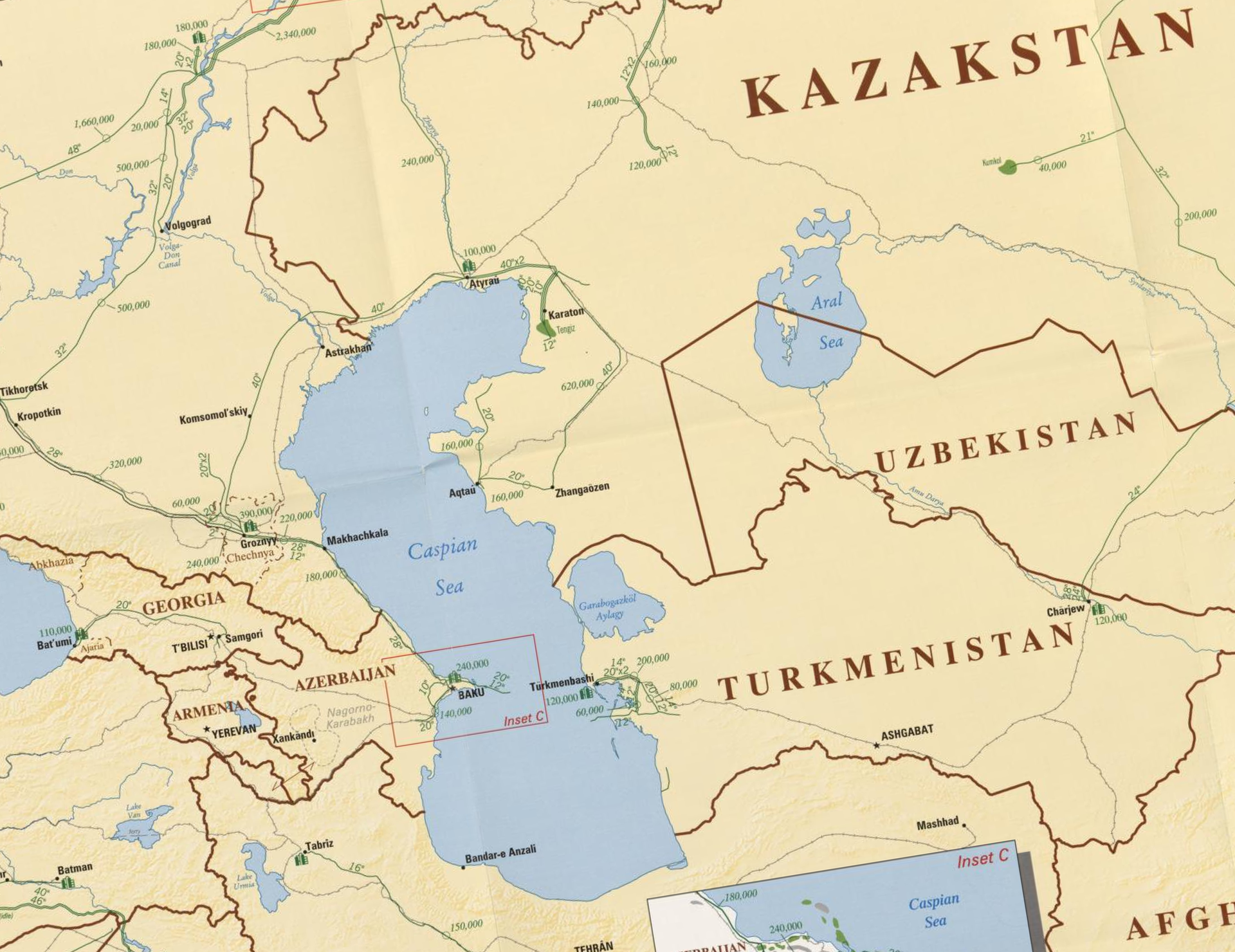Caspian Security: Azerbaijan-Kazakhstan Partnership for Protecting Sea Lines of Communication (SLOC)

Since 2022, the geopolitical landscape of Central Asia has undergone significant transformation. The Russia-Ukraine war has shifted national interests, prompting countries to reassess their foreign policies and security strategies. For Azerbaijan and Kazakhstan, the Caspian Sea—a vital energy and trade route—has emerged as a crucial focal point of national security, leading both nations to rethink how to safeguard their maritime interests.
Before 2022, Kazakhstan relied heavily on Russia as a transport corridor for exporting its natural resources to the West, primarily through the Caspian Pipeline Consortium (CPC). The CPC facilitated the transportation of Caspian oil from the Tengiz oil field in Kazakhstan to the Novorossiysk-2 Marine Terminal, a key export point at the Russian Black Sea port of Novorossiysk.
However, in the wake of the conflict in Ukraine, Astana has sought alternative export routes, notably turning to the Caspian region. The Trans-Caspian International Transport Route, often referred to as the "Middle Corridor," connects Southeast Asia and China with Europe, passing through the Caspian Sea to Azerbaijan and Georgia before reaching the Black Sea.
While several factors have driven Kazakhstan to explore alternative routes, it is essential to clarify that this shift is not merely a geopolitical shift away from Russia. The Kremlin also views the Middle Corridor as an opportunity to diversify its transportation routes and mitigate the impact of Western sanctions.
Multilateral Cooperation and the Caspian Five
Beyond bilateral relations, Azerbaijan and Kazakhstan must navigate the multilateral dynamics of the Caspian region. In the 1990s, efforts to establish a direct pipeline between Kazakhstan and Azerbaijan were thwarted by Russia and Iran, both of whom sought to dominate the power dynamics in the Caspian basin. However, signing the Caspian Convention in 2018 marked a turning point, nullifying previous vetoes from Russia and Iran. The convention set out the legal framework for Caspian littoral states—Azerbaijan, Kazakhstan, Russia, Iran, and Turkmenistan—regarding resource division, environmental management, and security.
This multilateral framework provides Azerbaijan and Kazakhstan with a stable platform for cooperation, allowing them to avoid direct confrontations with regional powers while focusing on their economic and security interests. By leveraging these existing legal frameworks, the two countries can pursue maritime security without triggering regional instability.
Who Will Secure the New Route?
Azerbaijan offers considerable military expertise, particularly in drone technology, refined through its recent conflicts in Karabakh. This gives Baku a distinct advantage, especially in aerial combat and the use of drones. Potentially this drone warfare experience could contribute to the development of naval and underwater drones, which can play a pivotal role in securing the Caspian Sea Lines of Communication without a shift of balance in the Caspian region. Kazakhstan lacks comparable military experience, especially in maritime security. However, Kazakhstan can contribute to the region differently by promoting "good governance" and strengthening the connection between the South Caucasus and Central Asia. Kazakhstan's diplomatic experience, particularly in facilitating dialogue between conflicting parties, positions Astana as a potential guarantor of peace in the South Caucasus. Kazakhstan’s role in fostering stability through diplomacy could complement Azerbaijan’s military capabilities, creating a balanced approach to regional security.
Furthermore, Azerbaijan has effectively deployed advanced intelligence, surveillance, and reconnaissance (ISR) systems, a domain in which Kazakhstan lags due to its limited military experience, particularly in maritime security. Azerbaijan's capability to gather and interpret real-time intelligence provides a significant advantage in safeguarding vital maritime trade routes in the Caspian Sea. While Azerbaijan focuses on securing the Caspian from potential threats, Kazakhstan could complement these efforts by enhancing its role in connecting Azerbaijan to China through key infrastructure projects. This strategic cooperation would not only bolster Azerbaijan's economic and geopolitical interests but also strengthen Kazakhstan's position as a crucial link within the Belt and Road Initiative, ensuring the stability of the region's trade and energy corridors.
Why Not Build a Larger Navy in the Caspian Sea?
For Kazakhstan, building a larger naval presence in the Caspian Sea could disrupt the current balance of power in the region. Expanding naval capabilities could provoke an arms race, triggering insecurity among neighboring states like Russia and Iran. This could complicate Kazakhstan's desire to maintain a neutral, balanced foreign policy.
Moreover, President Qasym-Jomart Toqayev’s administration places high importance on economic welfare and the well-being of citizens, which has been a central theme in his public addresses. The priority on economic growth means that Kazakhstan is unlikely to invest heavily in military building. Instead, partnering with Azerbaijan in defense initiatives, such as joint training exercises, intelligence sharing, and capacity-building programs, might be a more pragmatic and cost-effective way to bolster Kazakhstan’s maritime security without triggering regional tensions.
Kazakhstan, while not as militarily assertive as Azerbaijan, is taking steps to strengthen its military capabilities. In July 2023, Astana signed an agreement with Turkey to produce ships for its navy, marking a notable shift in its defense strategy. Additionally, the country is purchasing Turkish drones and plans to produce the Anka model locally. Also, Kazakhstan launched a new project, the accelerator DefTech, which serves as a platform for business innovation aimed at addressing military challenges.
However, it's important to note that Kazakhstan's expenditure on arms procurement remains very low, less than 1% of its GDP. Additionally, the absence of a constant threat from neighboring countries—thanks to Kazakhstan's successful efforts to remark and delimitate every inch of its borders—means that the public is generally unwilling to support a significant increase in the military budget. On the other hand, Azerbaijan, due to its more challenging geopolitical environment, naturally requires a more substantial military build-up to safeguard its national interests.
Kazakhstan’s geography also presents unique challenges in terms of security governance. The distance between the capital, Astana, and the coastal city of Aktau is approximately 2,600 kilometers, complicating efforts to ensure comprehensive security across the entire territory. Given these factors, Baku could play a key role as a security partner in the Caspian region.
What do we have?
In July 2024, Kazakhstan’s Ministry of Defense conducted the "Birlestik-2024" military exercises, involving three Central Asian countries and Azerbaijan. The exercise’s name, “Birlestik” (meaning “unity” in Turkic languages), reflects the symbolic importance of regional cooperation. These exercises highlight Kazakhstan’s efforts to build military partnerships within its neighborhood, strengthening its position as a security provider. There is a clear understanding about Azerbaijan in Kazakhstan that it is a powerful and reliable ally.
Potentially Baku could be not only a partner in projects such as the Middle Corridor and security provider in the Caspian region but also the facilitator of closer military cooperation with Kazakhstan. Military partnerships could also expand to other spheres such as special forces, combat experience in mountains, drone usage, command, strategy, etc.
Energy Security as a Key Factor in Pragmatic Cooperation
Azerbaijan and Kazakhstan rely heavily on energy exports, which makes securing maritime infrastructure a top priority. The Middle Corridor is not just a trade route but a vital artery for transporting oil, especially as Kazakhstan looks to diversify its energy partners.
Joint efforts to protect critical energy infrastructure, such as pipelines and ports, are essential. Energy security presents a unique opportunity for deeper collaboration between the two nations, allowing them to align their security needs with their broader economic goals. By coordinating on energy security, Azerbaijan and Kazakhstan can ensure the uninterrupted flow of resources to global markets, thereby increasing interdependence between each other and contributing to regional stability.
Non-Traditional Security Threats in the Caspian
In addition to conventional military threats, non-traditional risks such as environmental hazards, smuggling, and piracy in the Caspian Sea also pose significant challenges. Both nations must be prepared to address these issues as part of their broader security strategy. Azerbaijan and Kazakhstan can enhance their cooperation by establishing joint rapid response mechanisms to deal with oil spills, piracy, or illicit trafficking in the region.
By focusing on these non-traditional security challenges, Azerbaijan and Kazakhstan can further secure the Caspian as a zone of peace and stability, ensuring that their economic lifelines remain protected from unforeseen disruptions.
The Role of China and the Belt and Road Initiative (BRI)
China’s Belt and Road Initiative (BRI) has added a new dimension to Central Asia’s geopolitical dynamics. Kazakhstan plays a key role in the BRI, and China’s interest in securing stable trade routes through the Middle Corridor means that Beijing has a vested interest in regional security. Azerbaijan and Kazakhstan could benefit from Chinese investments in infrastructure and logistics, but they must carefully manage these partnerships to avoid becoming over-reliant on Chinese influence.
According to the French online resource “Intelligence Online” recently, Beijing has been preparing to deploy military units to protect Chinese foreign investments under the BRI, as seen with the People's Armed Forces Departments (PAFD), which were trialed in countries like Pakistan and Hungary. These units are tasked with ensuring the security of Chinese state firms abroad, responding to natural disasters, and maintaining stability during unrest. The deployment of PAFD units abroad signals China’s intent to exert more direct control over its investments, raising concerns about the militarization of economic initiatives.
For Azerbaijan and Kazakhstan, this highlights the importance of strengthening their own military and security cooperation to prevent the need for external military involvement in protecting key BRI projects. By enhancing joint military security and cooperation, both nations can mitigate the risk of China deploying its forces in the region under the guise of protecting economic interests. Ensuring that local security forces are capable of safeguarding BRI projects can help maintain national sovereignty while still benefiting from Chinese investments. Pragmatic cooperation with China on infrastructure projects while maintaining strategic autonomy remains critical for both countries.
Conclusion
Azerbaijan and Kazakhstan face the challenge of securing their maritime routes in the Caspian Sea, yet their differing capabilities and strategic priorities will shape their approach to Caspian security. A pragmatic, cooperative framework that leverages Azerbaijan’s military expertise while allowing Kazakhstan to focus on economic development and non-traditional security threats may offer the most sustainable path forward.
Furthermore, recognizing the shifting internal and external political landscapes, particularly Kazakhstan’s desire for neutrality, will be essential in maintaining a balanced partnership. Joint efforts in energy security, naval cooperation, and countering non-traditional threats can provide both countries with the tools they need to safeguard their maritime interests in this increasingly complex geopolitical environment.







